-
 Bitcoin
Bitcoin $103,330.7342
-0.11% -
 Ethereum
Ethereum $2,608.3446
5.06% -
 XRP
XRP $2.6457
4.13% -
 Tether USDt
Tether USDt $0.9999
0.00% -
 Solana
Solana $179.7325
3.44% -
 BNB
BNB $655.0221
0.43% -
 USDC
USDC $1.0001
-0.01% -
 Dogecoin
Dogecoin $0.2353
3.60% -
 Cardano
Cardano $0.8173
2.13% -
 TRON
TRON $0.2736
3.59% -
 Sui
Sui $3.9276
-1.97% -
 Chainlink
Chainlink $17.0155
2.37% -
 Avalanche
Avalanche $25.6632
4.53% -
 Stellar
Stellar $0.3154
2.35% -
 Shiba Inu
Shiba Inu $0.0...01591
2.01% -
 Hedera
Hedera $0.2121
1.11% -
 Hyperliquid
Hyperliquid $25.3093
0.70% -
 Pi
Pi $1.1756
5.81% -
 Toncoin
Toncoin $3.3493
0.98% -
 UNUS SED LEO
UNUS SED LEO $8.8578
3.12% -
 Bitcoin Cash
Bitcoin Cash $405.4948
0.73% -
 Polkadot
Polkadot $5.0875
1.18% -
 Litecoin
Litecoin $102.3725
-0.06% -
 Monero
Monero $339.0342
0.03% -
 Pepe
Pepe $0.0...01400
0.00% -
 Bitget Token
Bitget Token $4.7870
0.83% -
 Dai
Dai $1.0000
-0.02% -
 Ethena USDe
Ethena USDe $1.0006
-0.02% -
 Uniswap
Uniswap $6.7190
-0.54% -
 Bittensor
Bittensor $454.6908
-2.36%
Is Bitcoin wallet address universal between different wallet software?
Bitcoin wallet addresses are unique, but the private key management differs across software. Security and user experience vary greatly; importing/exporting private keys is risky, and multiple wallets don't guarantee better security without careful management.
Mar 14, 2025 at 09:00 am
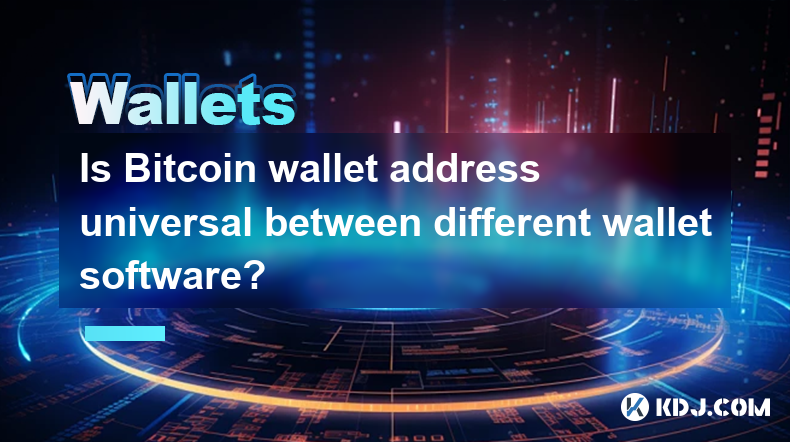
Key Points:
- Bitcoin wallet addresses are unique to each wallet, regardless of the software used.
- While the address itself looks the same, the underlying private key management differs significantly between wallets.
- Security features and user experience vary widely across different Bitcoin wallet software.
- Importing/exporting private keys carries significant security risks.
- Using multiple wallets doesn't inherently improve security if not managed correctly.
Is Bitcoin Wallet Address Universal Between Different Wallet Software?
No, a Bitcoin wallet address is not universally compatible across different wallet software in the sense that you cannot directly access the same funds from one wallet using another wallet's interface without proper key management. While the address itself remains consistent – representing the public key – the way each wallet software manages the corresponding private key (which allows you to spend the bitcoins) differs substantially. Think of it like having a mailbox (the address) and the key to that mailbox (the private key). The mailbox remains the same, but the key you possess to access it might be managed differently by various mail service providers.
Consider the scenario where you have Bitcoin in a wallet provided by a specific exchange. The exchange holds the private keys associated with your address. You only interact with your balance through their interface. You can't simply import that address into a different software wallet and gain access to the funds directly. The exchange controls access to those private keys.
Different wallet software employs different security mechanisms, such as hardware wallets offering extra protection through physical devices, software wallets utilizing password protection and encryption, and paper wallets storing the private key offline. These variations directly impact the security and user experience, even though the underlying Bitcoin address remains the same.
The process of transferring Bitcoin involves sending the funds from one address to another. The sending wallet uses the associated private key to sign the transaction, verifying your ownership and authorizing the transfer. The receiving wallet then displays the incoming transaction in its balance, based on the public address used in the transaction. The wallet software plays a crucial role in this process, but the Bitcoin address itself is simply a unique identifier, not tied to any particular wallet software.
One common misconception is that simply knowing the Bitcoin address grants access to the funds. This is incorrect. The private key, which is never shared directly with the wallet software, is the only way to spend the bitcoins associated with that address. Losing the private key is equivalent to losing access to your Bitcoin.
Many users might wonder about importing and exporting private keys between different wallet software. While technically possible, this practice is highly discouraged due to significant security risks. Improper handling can lead to irreversible loss of funds or exposure to malicious actors. Each wallet's interface and security measures are designed to work with its specific private key management system. Transferring them between incompatible systems often leads to errors or vulnerabilities.
Let's explore different types of Bitcoin wallets and how they handle private keys.
- Software Wallets: These wallets store your private keys on your computer or mobile device. They offer varying degrees of security depending on the software and its implementation of encryption and password protection.
- Hardware Wallets: These wallets store your private keys on a dedicated physical device, offering a significantly higher level of security than software wallets as they are not directly connected to the internet.
- Paper Wallets: These wallets store your public and private keys as printed QR codes or text. They are considered secure when stored offline but are prone to physical damage or loss.
Using multiple wallets is a common strategy employed by some users to diversify risk. However, this does not automatically improve security. It requires meticulous record-keeping and careful management of private keys for each wallet. Losing access to even one wallet means losing the funds associated with that wallet. The multiple wallets strategy is more about risk mitigation than a guaranteed security enhancement.
Frequently Asked Questions:
Q: Can I use the same Bitcoin address across different wallets?
A: Yes, you can reuse a Bitcoin address. However, it's generally recommended to use a new address for each transaction for enhanced privacy.
Q: If I lose my wallet software, will I lose my Bitcoin?
A: Not necessarily. If you have your private key securely backed up, you can restore your wallet in a different software wallet or hardware wallet. However, losing your private key results in permanent loss of your Bitcoin.
Q: Is it safe to share my Bitcoin address?
A: Sharing your Bitcoin address is generally safe. It's like sharing your email address – it allows others to send you Bitcoin. However, never share your private key with anyone.
Q: Can I transfer my Bitcoin from one wallet to another using only the address?
A: No, you need your private key associated with the Bitcoin in the sending wallet to initiate the transfer. The address only identifies the destination for the funds.
Q: What happens if I forget my wallet password?
A: The process for recovering your wallet depends on the specific wallet software and whether you have a recovery phrase or seed. Without proper recovery measures, you may lose access to your funds.
Q: Can I move Bitcoin from an exchange to a personal wallet?
A: Yes, you can typically withdraw your Bitcoin from an exchange to a personal wallet by providing your personal wallet's Bitcoin address. However, ensure you accurately enter the address to avoid irreversible loss of funds.
Q: What is the difference between a public key and a private key?
A: Your public key is your Bitcoin address, which you share with others to receive payments. Your private key is a secret code that proves ownership and allows you to spend your Bitcoin. Never share your private key.
Disclaimer:info@kdj.com
The information provided is not trading advice. kdj.com does not assume any responsibility for any investments made based on the information provided in this article. Cryptocurrencies are highly volatile and it is highly recommended that you invest with caution after thorough research!
If you believe that the content used on this website infringes your copyright, please contact us immediately (info@kdj.com) and we will delete it promptly.
- Experience Bitcoin mining from the comfort of your own home in 2025 with WinnerMining's latest ASIC hardware
- 2025-05-14 17:05:13
- What is the Q-Day Prize?
- 2025-05-14 17:05:13
- Bitcoin (BTC) Spot ETFs Record $96 Million in Daily Outflows
- 2025-05-14 17:00:12
- The Cryptomarkt is running at full speed again
- 2025-05-14 17:00:12
- Pi Network (PI) Cools Down After 90% Rally, But Analysts Remain Unfazed
- 2025-05-14 16:55:12
- XRP (XRP): XRP Price prediction flat for five years
- 2025-05-14 16:55:12
Related knowledge
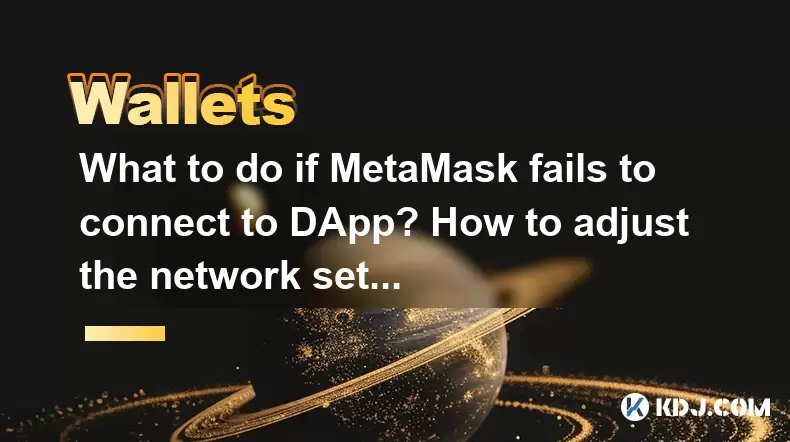
What to do if MetaMask fails to connect to DApp? How to adjust the network settings?
May 14,2025 at 04:49pm
If you're experiencing issues with MetaMask failing to connect to a decentralized application (DApp) and need to adjust your network settings, this guide will walk you through the troubleshooting steps and network configuration adjustments. Let's delve into the specifics of resolving these issues. Understanding MetaMask Connection IssuesMetaMask is a po...
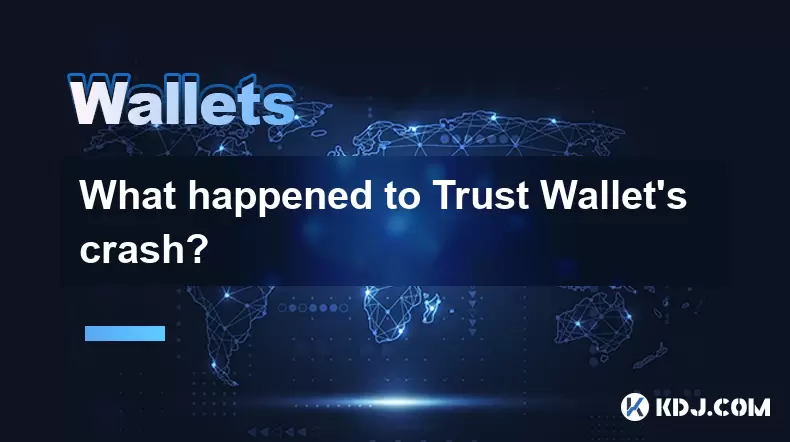
What happened to Trust Wallet's crash?
May 14,2025 at 04:14pm
On a seemingly ordinary day, the cryptocurrency community was rocked by an unexpected event: the crash of Trust Wallet, one of the most popular mobile cryptocurrency wallets. This incident left many users scrambling to understand what had happened and how it would affect their digital assets. In this article, we will delve into the details of the Trust ...

What to do if Trust Wallet balance query fails?
May 14,2025 at 04:22pm
If you encounter a situation where your Trust Wallet balance query fails, it can be frustrating and concerning. However, there are several steps you can take to troubleshoot and resolve this issue. This article will guide you through the process, ensuring you can access your cryptocurrency balances smoothly. Understanding Trust Wallet Balance Query Fail...
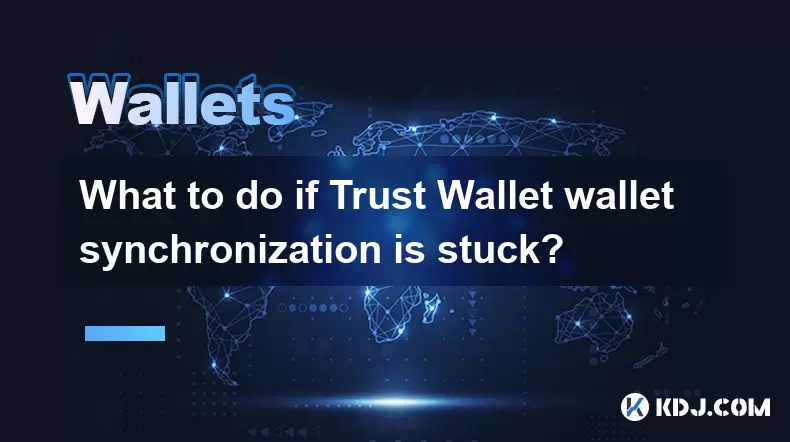
What to do if Trust Wallet wallet synchronization is stuck?
May 14,2025 at 05:57pm
If you're experiencing issues with your Trust Wallet synchronization being stuck, it can be frustrating and worrisome. However, there are several steps you can take to resolve this problem and get your wallet functioning smoothly again. This article will guide you through various troubleshooting methods to help you resolve the synchronization issue. Und...
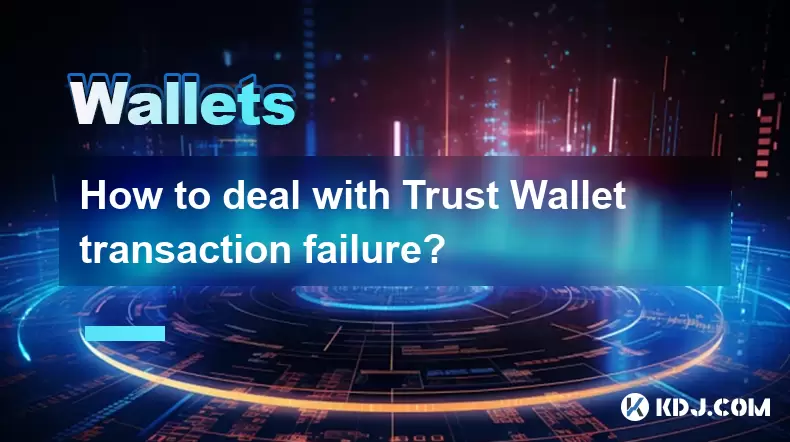
How to deal with Trust Wallet transaction failure?
May 14,2025 at 04:35pm
Dealing with transaction failures in Trust Wallet can be frustrating, but understanding the common causes and solutions can help you navigate these issues smoothly. Trust Wallet is a popular mobile cryptocurrency wallet that supports a wide range of cryptocurrencies and tokens. Transaction failures can occur due to various reasons, including network con...
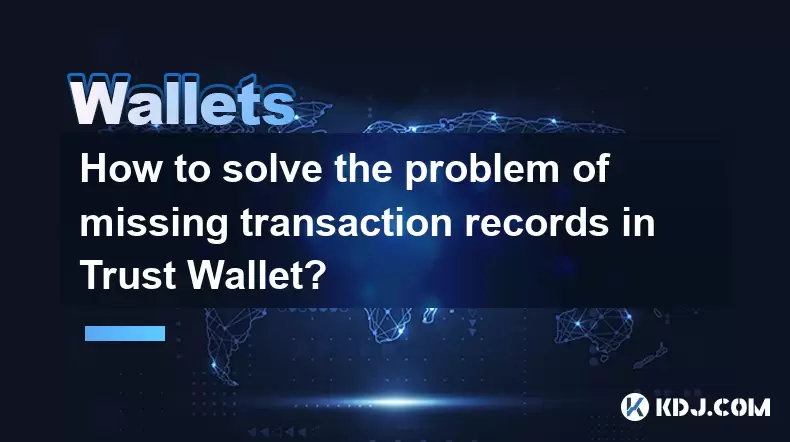
How to solve the problem of missing transaction records in Trust Wallet?
May 14,2025 at 05:07pm
Introduction to Missing Transaction Records in Trust WalletTrust Wallet is a popular cryptocurrency wallet that supports a wide variety of tokens and blockchain networks. However, users sometimes encounter issues such as missing transaction records. This can be a frustrating experience, especially when trying to track financial transactions or troublesh...

What to do if MetaMask fails to connect to DApp? How to adjust the network settings?
May 14,2025 at 04:49pm
If you're experiencing issues with MetaMask failing to connect to a decentralized application (DApp) and need to adjust your network settings, this guide will walk you through the troubleshooting steps and network configuration adjustments. Let's delve into the specifics of resolving these issues. Understanding MetaMask Connection IssuesMetaMask is a po...

What happened to Trust Wallet's crash?
May 14,2025 at 04:14pm
On a seemingly ordinary day, the cryptocurrency community was rocked by an unexpected event: the crash of Trust Wallet, one of the most popular mobile cryptocurrency wallets. This incident left many users scrambling to understand what had happened and how it would affect their digital assets. In this article, we will delve into the details of the Trust ...

What to do if Trust Wallet balance query fails?
May 14,2025 at 04:22pm
If you encounter a situation where your Trust Wallet balance query fails, it can be frustrating and concerning. However, there are several steps you can take to troubleshoot and resolve this issue. This article will guide you through the process, ensuring you can access your cryptocurrency balances smoothly. Understanding Trust Wallet Balance Query Fail...

What to do if Trust Wallet wallet synchronization is stuck?
May 14,2025 at 05:57pm
If you're experiencing issues with your Trust Wallet synchronization being stuck, it can be frustrating and worrisome. However, there are several steps you can take to resolve this problem and get your wallet functioning smoothly again. This article will guide you through various troubleshooting methods to help you resolve the synchronization issue. Und...

How to deal with Trust Wallet transaction failure?
May 14,2025 at 04:35pm
Dealing with transaction failures in Trust Wallet can be frustrating, but understanding the common causes and solutions can help you navigate these issues smoothly. Trust Wallet is a popular mobile cryptocurrency wallet that supports a wide range of cryptocurrencies and tokens. Transaction failures can occur due to various reasons, including network con...

How to solve the problem of missing transaction records in Trust Wallet?
May 14,2025 at 05:07pm
Introduction to Missing Transaction Records in Trust WalletTrust Wallet is a popular cryptocurrency wallet that supports a wide variety of tokens and blockchain networks. However, users sometimes encounter issues such as missing transaction records. This can be a frustrating experience, especially when trying to track financial transactions or troublesh...
See all articles



















![[Market 5.13] BTC continues to play music and dance? #btc #ETH #sol #doge [Market 5.13] BTC continues to play music and dance? #btc #ETH #sol #doge](/uploads/2025/05/14/cryptocurrencies-news/videos/market-btc-continues-play-music-dance-btc-eth-sol-doge/image_500_375.webp)




![[Ronnie Trading Guide]-2025.5.14-Notice: Bitcoin will test the previous high soon~ wait and see~ [Ronnie Trading Guide]-2025.5.14-Notice: Bitcoin will test the previous high soon~ wait and see~](/uploads/2025/05/14/cryptocurrencies-news/videos/ronnie-trading-guidenotice-bitcoin-test-previous-wait/image_500_375.webp)





























































